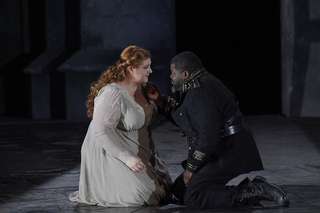|
Back
Excellent singing, puzzling staging Toronto
The Four Seasons Centre for the Performing Arts
04/27/2019 - & April 30, May 3, 9, 12, 15, 18, 21, 2019
Giuseppe Verdi: Otello
Russell Thomas (Otello), Tamara Wilson (Desdemona), Gerald Finley (Iago), Carolyn Sproule (Emilia), Andrew Haji (Cassio), Owen McCauland (Rogerigo), Onay Köse (Lodovico), Brandon Cedel (Montano, A Herald)
The Canadian Opera Company Chorus, Sandra Horst (chorus master), The Canadian Opera Company Orchestra, Johannes Debus (conductor)
David Alden (director), Ian Rutherford (associate director), Jon Morrell (set and costume designer), Adam Silverman (lighting designer), Andrew Cutbush (associate lighting director), Maxine Braham (movement director)

T. Wilson, R. Thomas (© Michael Cooper)
In his director’s note, David Alden states that for Otello “rough walls, a large empty arena and intense contrasts of darkness and light are all you need as a playing space”. His production demonstrates just how short of the mark this notion falls.
The overall look of the unit set and costuming is non-stop drab. The highly kinetic lighting counteracts this at times, most notably in the storm scene. Amidst the large chorus are 12 dancers who at times are assigned puzzling jerky movements; I presume Maxine Braham (credited as movement director) is responsible for this. The lovely scene where local women and children present flowers to Desdemona is presented in a furtive, menacing way that is just plain creepy. The grand arrival of Lodovico and his Venetian nobles is also deliberately undercut, especially given that Otello has already been reduced to a trembling mess huddled in a chair. The glorious music seems out of place.
Alden notes that the production is set around the period of the opera’s composition; I don’t know what insights this leads to except that the 1880s in Italy seems to have been notably dreary and drab (that word again!)
In the final act there is no bed; Desdemona sleeps huddled against the proscenium (arousing a few snickers), and the intimate exchange between her and Otello occurs with them on opposite sides of the stage.
Mercifully there is some terrific singing. Russell Thomas’s voice hasn’t quite grown into the role but it comes close to being totally suitable. He has to really work at it (the role requires this from anyone doing it) but he doesn’t shriek or holler and I don’t think it is straining his voice. He deserves to perform it in a more congenial production.
This is Tamara Wilson’s fourth role with the COC; she has always displayed a fine voice but this time there is an extra expressive range that makes her one of the best Desdemonas I have ever heard (going back to Teresa Stratas in 1967).
The production’s oddities give way for Gerald Finley to deliver a chilling performance as Iago; his “Credo” assaults the audience. (Hard to believe his last role here was Falstaff!) Iago is supposed to be taken away once his guilt has been established but this time he gets to sit and watch the denouement, grinning psychotically the while. (This works wonderfully in its macabre way).
Smaller roles are also very well cast. Emilia doesn’t get to sing much until in the final moments she becomes the one who perceives what Iago has been up to; Carolyn Sproule makes the most of this brief scene. Onay Köse displays a voice of some distinction as the Venetian ambassador, while Brandon Cedel makes a nice impression in his two short roles.
The COC chorus, boosted to 60 members, is viscerally thrilling. Johannes Debus handles it all with his usual care and flair.
This production was first seen at the English National Opera in 2015, then in Madrid and Stockholm; it soon goes on to Washington. You would think these companies could find a better production somewhere else. The three other productions the COC has received from ENO in recent years (Lucia di Lammermoor, Rigoletto, and Die Fledermaus) have all been underwhelming as well. One reads that ENO keeps lurching through one existential crisis after another. With whimsical, inconsequential productions that detract from top performers’ best efforts it comes as no surprise.
Michael Johnson
|